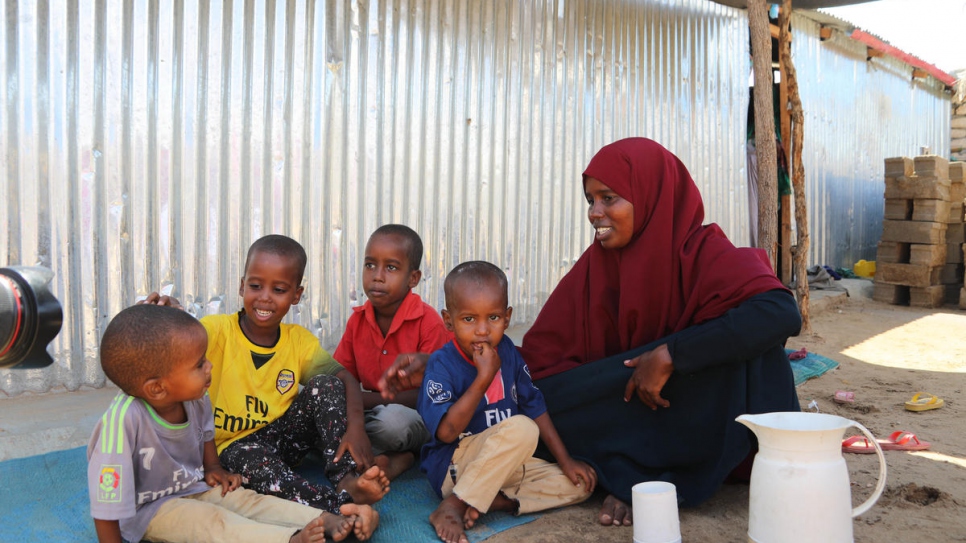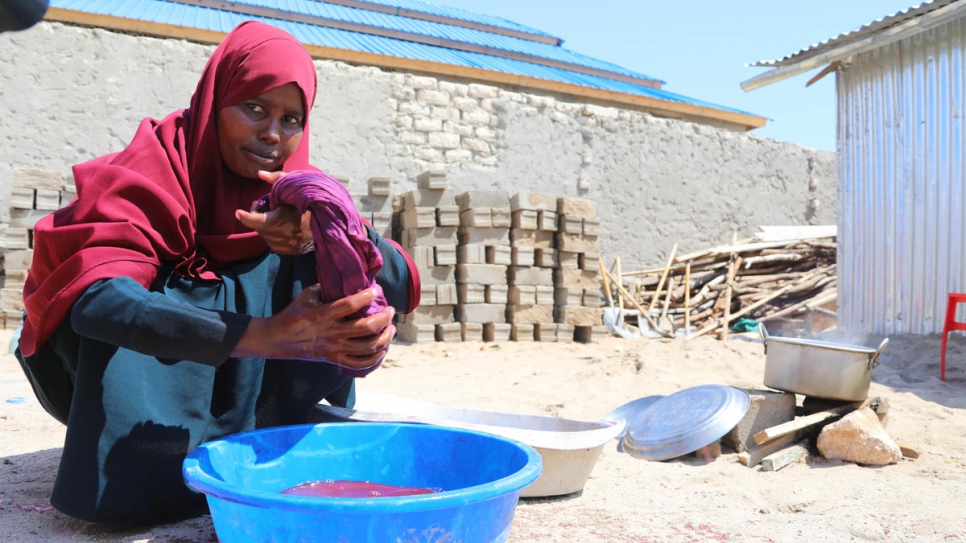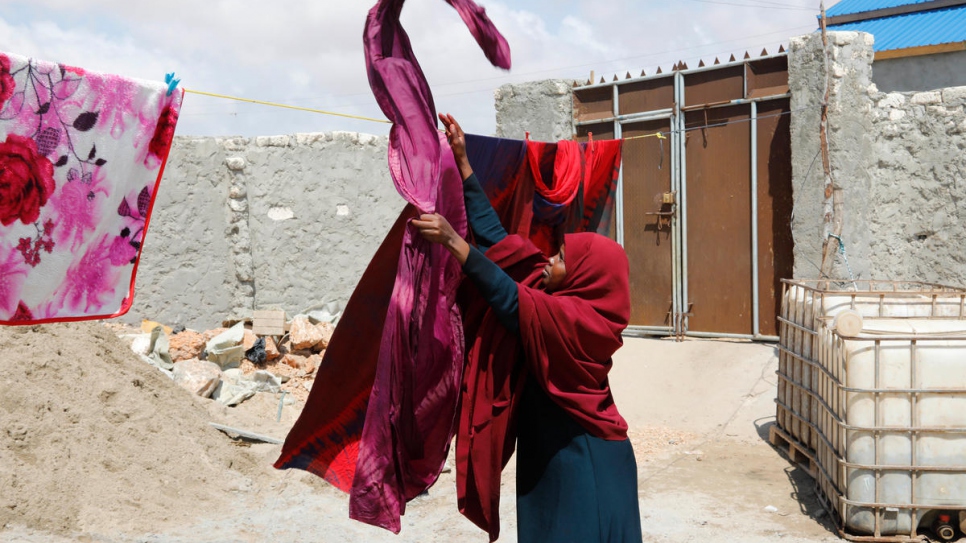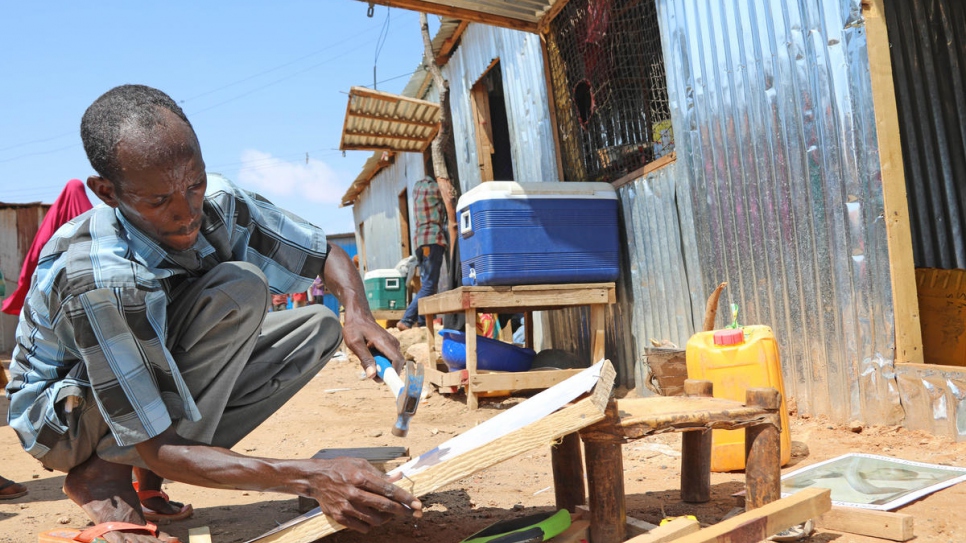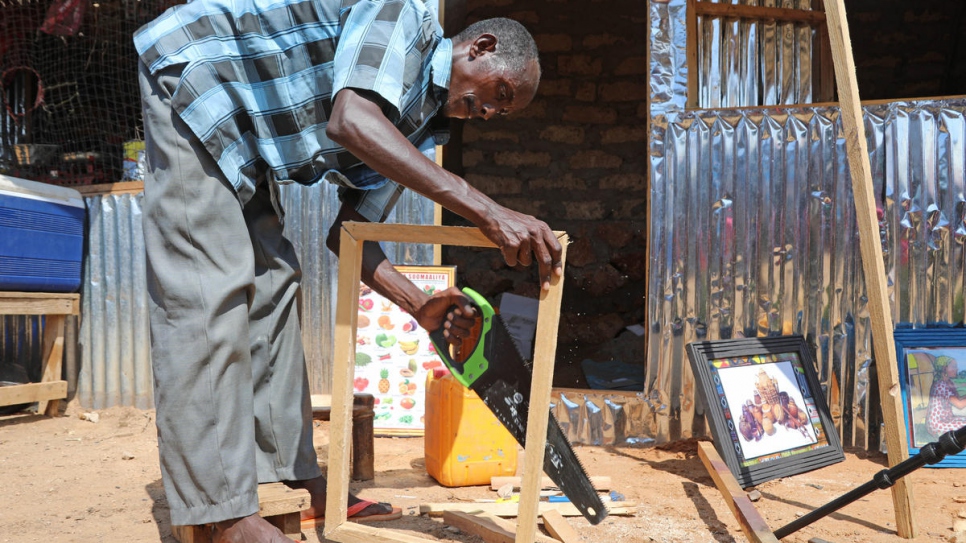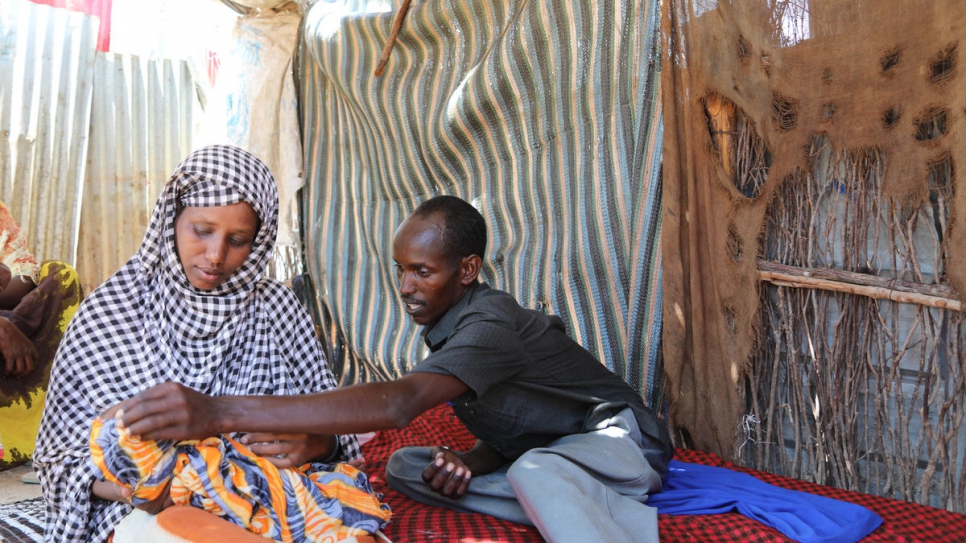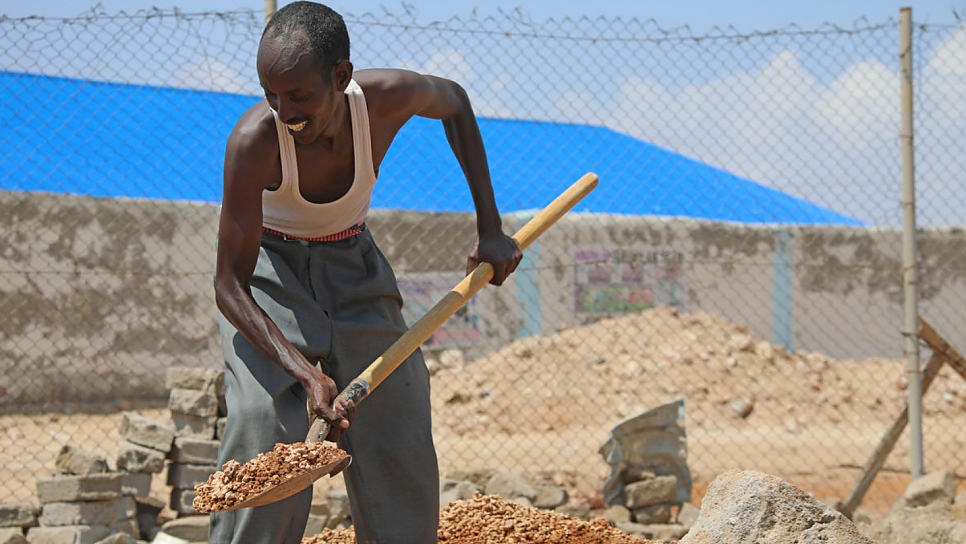Support programmes give Somali returnees a chance to rebuild
UNHCR equips refugees who wish to return to Somalia with the skills to help them start over. However, more needs to be done.
Fadumo sells her tie-dyed fabrics in the market in Kismayo, as well as in her shop, which also stocks fruit and vegetables.
© UNHCR/Feisal Omar
Fadumo* furrows her brow as she concentrates on folding the piece of cloth spread out before her.
She soaks it in a mixture of salt, hot water and dye for a few hours and, after rinsing it, reveals a beautifully patterned cloth that she hangs out to dry. This is another of her intricately designed tie-and-dye fabrics that have made her renowned in Kismayo.
“I really enjoy my work with tie and dye especially when I wash the clothes and hang them to dry,” she says.
Last year, she could barely foresee a life where she was in control and earning an income. Born and raised in Kenya’s Dadaab camp, Fadumo, 24, could only imagine her homeland through the stories and memories shared by her parents, who fled Somalia’s civil war in 1991.
That August, she finally had an opportunity to make her dreams of going home become a reality. She and her family decided to return to Kismayo in southern Somalia, which her parents had left nearly three decades ago.
It is a decision she does not regret.
“I am so grateful that we decided to come back home as our country is gradually becoming peaceful,” she says.
However, settling in Somalia was not easy. Besides adjusting to a new environment still rife with security problems and a severe lack of infrastructure, Fadumo quickly realised that she needed a job to help her take care of her three young sons.
“I can afford food, I am able to pay rent and take my eldest son to school.”
She learned of a centre in Kismayo that supports returnees. UNHCR, the UN Refugee Agency, funds the Returnee Support Centre which is run by the American Refugee Committee (ARC) -- an international non-governmental organization that supports returnees in Somalia in partnership with UNHCR.
Fadumo registered for courses in computer literacy and technical vocational education and training (TVET). The three-month course taught her tie-and-dye skills and, soon after completing her training, she took out a US$500 loan through ARC’s micro finance programme.
She started her own business and now runs a busy workshop, making beautiful garments that she sells in the local market. She also started a small grocery shop selling fruit and vegetables.
More than a year later, Fadumo has found success, and sense of belonging, for the first time in her life.
“Life here is much better than in the refugee camp,” she says. “I can afford food, I am able to pay rent and take my eldest son to school.”
She has also been steadily repaying the loan, made possible by the daily income she generates from her two businesses.
“Most returnees do not have the right skills to get gainful employment when they return,” said William Ejalu, the head of UNHCR’s sub office, in Mogadishu. “TVET is therefore a handy tool that helps them acquire the right skills and provides them an equal opportunity to compete for jobs.”
The support centre was set up last year when the first group of returnees started to arrive in large numbers in Somalia. Since then, through the programme UNHCR has been able to support 1,200 returnees, including 100 in Kismayo alone. The trainees receive cash grants to start businesses and are supported by regular visits from their trainers.

Somalia: Returning refugees rebuild their lives and country (Mary Theru, producer / Mohamed Sheikh Nor, camera / Arnold Temple, editor)
Mohamed* another beneficiary of the TVET programme, returned to Somalia last December. He left his home town in Jamame for Dadaab at the height of the 2011 drought with his wife, his brother’s widow and her four children.
Returning to his homeland was always on his mind.
“The prevailing mood in the country was of optimism and peace,” he says. “So, we decided to come back home.”
Like Fadumo, he was faced with no prospect of an income and struggled to readjust to life back in Somalia, taking care of his brother’s family and his own. Through the TVET programme, his optimism was rekindled.
“The agency really came to our aid and showed us all the opportunities available for us to establish a new life in the town,” he explains, referring to the support he received through the centre.
He graduated in June with skills in carpentry, and has started a small business making high-quality picture frames. He sells the frames for between US$10 and US$22 each, making a good profit. Mohamed’s products are so popular that the ARC and the centre have commissioned him to make frames for their offices.
Since December 2014, when the voluntary return exercise was officially launched, more than 75,000 Somalis have returned from Kenya’s Dadaab and Kakuma refugee camps. UNHCR issues returnees with a package consisting of a cash allowance to sustain them for the first six months in Somalia and support to start businesses.
However, the scale of returns to Somalia continues to be restricted since some areas in the country are still not safe for the millions that have been displaced. More than one million are internally displaced within Somalia and nearly another million are refugees.
According to Mohamed Affey, UNHCR’s Special Envoy on the Somali refugee situation, more needs to be done by the international community to support safe and dignified returns.
“Conditions need to improve in Somalia and this requires resources,” he says. “There needs to be a sincere commitment to mobilize resources that will allow the people to develop their country.”
Affey adds that returns will be viable only if the international community is strongly committed to a comprehensive approach to make conditions in Somalia safe for return.
“I feel welcome back here and, with my new skills, I can make a living.”
UNHCR and its partners are working to support programmes and strengthen systems to aid returnees’ transition back into their communities.
“These programmes are essential for ensuring that Somalis who voluntarily return are able to readjust to a new life and start the process of rebuilding their lives,” says UNHCR’s Ejalu.
Mohamed and Fadumo believe they are helping to rebuild their country, too.
“I feel welcome back here and with my new skills, I can make a living,” says Mohamed. He gives motivational talks at the centre where he shares his experiences. “This process has been an eye-opener and a reason to have hope in the future.”
As UNHCR and its partners continue to support returnees such as Fadumo and Mohamed, more needs to be done to ensure these returns are sustainable. Conditions should be right, and returnees should feel safe and have access to education, health and most importantly, an income. Only then can all those returning to Somalia echo Fadumo’s sentiments.
Fadumo is happy to be back in her home country, where feels a sense of freedom. “It is an extraordinary happiness.”
(Additional reporting and research by Mary Theru and Cathy Wachiaya in Nairobi)
*Names changed for protection reasons

